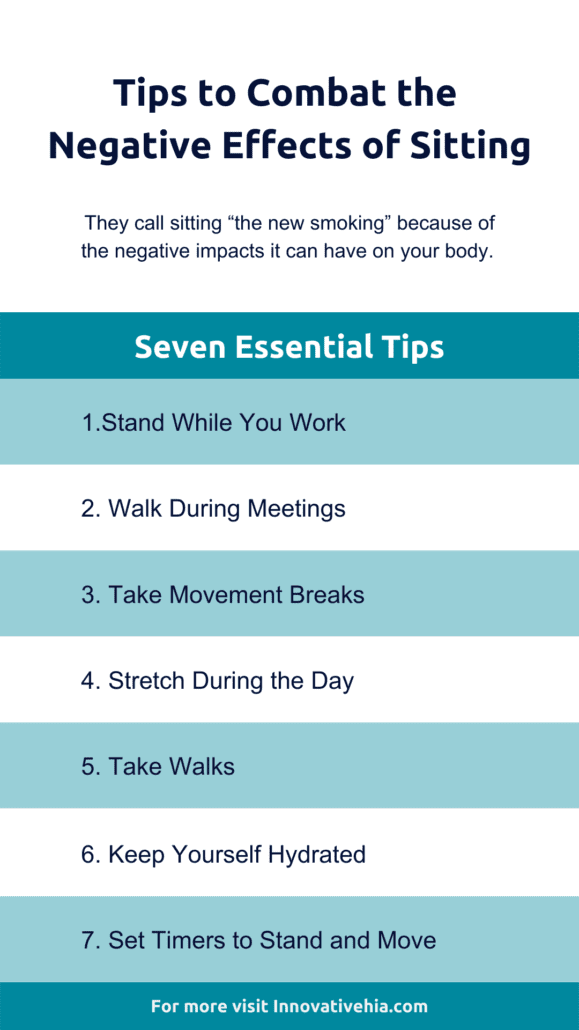Sitting is now one of the most common daily activities. Increased desk jobs and a bigger than ever stay-at-home workforce have contributed to more sedentary lives.
In fact, over a quarter of Americans sit for more than eight hours a day, and most sit for six to eight hours a day according to a report by TIME.
They call the results of sitting “the new smoking” because of the negative impacts it can have on your body. Do you sit all day? Are you tired of tight hamstrings or back pain?
Let’s dive into what sitting does to your body and how you can combat those negative effects daily.
What Does Sitting Do to Your Body?
Sitting doesn’t seem like it should or would be such a dangerous activity for your body. After all, you aren’t doing much—but that could be the point.
There are both long and short-term effects that sitting for long periods of time can have on your body. After all, they don’t call it the “new smoking” for no reason. Below are some details.
- Sitting can lead to weight gain because you spend less time moving/ exercising.
- Use it or lose it! You start to lose muscle in your legs and glutes because they don’t have to work to hold you up, which can cause muscle atrophy.
- Sitting is linked to increased lung, uterine, and colon cancer.
- Those who sit for longer periods of time are more likely to suffer from anxiety and depression.
- Sitting can lead to tight muscles, especially tightness in your hamstrings.
- Your body can experience back pain from poor posture (i.e. hunching over a computer screen for prolonged periods of time).
- You can also experience stiff shoulders and neck pain from bad posture.
- There is a higher risk for heart diseases like strokes and heart attacks.
- Sitting for long periods of time is linked to an increased risk of diabetes and can also lead to varicose veins.
- Sitting can cause deep vein thrombosis (DVT).
There are many negative effects of sitting that can be detrimental to your health. But how do you combat them when you have to work a desk job?
Combatting the Effects of Sitting
Just because you’re sitting all day doesn’t mean that you can’t combat its negative effects —you can. (After all, this article was written while standing!)
Here’s our guide on how you can combat the negative effects of sitting all day.
1. Stand While You Work
As mentioned before, you can stand while you work. Take advantage of standing desks so you can alternate from a seated to a standing position throughout the day. This will help get blood flowing through and also build muscle.
2. Walk During Meetings
If you can, walk or stand during your scheduled meetings or calls if you don’t have to be at your desk. Plug in earbuds to move while the call takes place.
3. Take Movement Breaks
Use your breaks to walk around and help avoid staying sedentary. It’s okay to start small and work your way up to longer breaks. This might look like walking up and down your stairs, around your office, or going for a quick stroll outside. Use your best judgment to find out what type of movement you like the most.
4. Stretch During the Day
Plug in a quick and easy stretch when you wake up, take your lunch break, or take a few minutes in the middle of your day. Here’s a link from healthline for an easy five minute stretch.
Stretching can help you recenter and refocus, boosting your productivity during the day.
5. Take Walks
Working straight throughout the day without breaks isn’t healthy or productive. Schedule time to take a quick walk.
6. Keep Yourself Hydrated
While you’re reading this, drink a glass of water. Staying hydrated is great for your health and refilling your water bottle forces you to get up and move.
7. Set Timers to Stand and Move
Yes, it’s easy to start on a project and then look up only to realize a few hours have flown by. During that time, you were probably sitting hunched over your laptop or workspace.
So, consider setting a timer on your computer, phone, or watch to remind yourself to get up and move!
A Final Note
Adding walking as a healthy habit can take time and practice. It’s okay that it may not come naturally or immediately. As you slowly integrate it into your life, have patience if it doesn’t happen immediately. Little movements daily will benefit your health in the long run.
Did you know that people who use their health insurance are healthier than those who don’t? Read the different minimum essential coverage options available to you to continue making health habit choices.

Original article published on SBMA Benefits.
